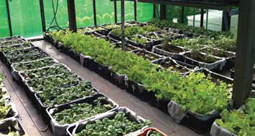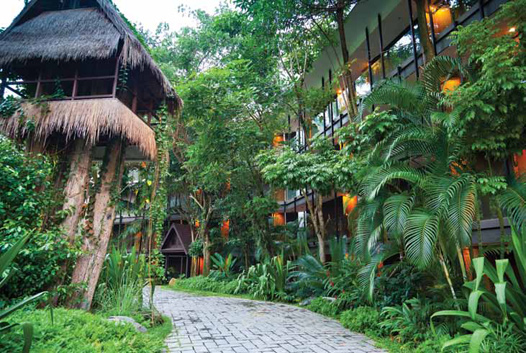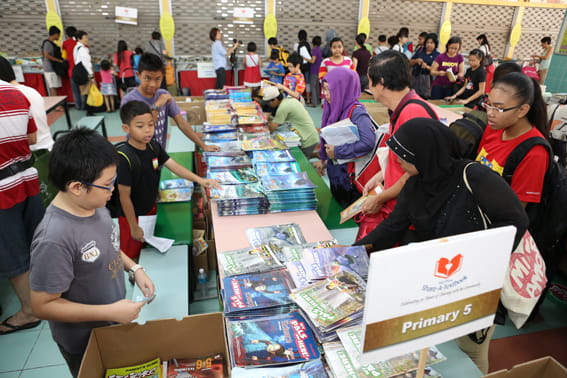Stories > Every Which Way
Every Which Way
 As a whole, the phrase “corporate social responsibility” may not excite much imagery, but if you look at the parts that make up the whole it can paint an intriguing picture. From earthworm composting to new schoolbags and a bank savings programme, it’s about changing how we think and live.
As a whole, the phrase “corporate social responsibility” may not excite much imagery, but if you look at the parts that make up the whole it can paint an intriguing picture. From earthworm composting to new schoolbags and a bank savings programme, it’s about changing how we think and live.
By Eve Yeo
Sustainability is the buzzword fuelling corporate social responsibility (CSR), driving its evolution from being one-off measures or occasional ad-hoc programmes to becoming an integral part of business operations. CSR is about investing in the future through health, education, green initiatives or more.
Incorporating such broad-based sustainability into CSR is gaining ground among companies in Singapore as more businesses realise its importance. Four companies show how they drive the CSR message.
Planting Seeds for the future
Located on Sentosa Island, Siloso Beach Resort conducts eco-tours twice a week for walk-in visitors as well as hotel guests. Visitors see the rooftop organic and non-organic gardens, the wormery where food waste is recycled, the swimming pool that is maintained by ionised salt instead of the usual chlorine and the energy-saving water heating tanks. Since 2007, some 4,300 participants, mainly from schools, have been on the walking eco-tour.
“Our concept and direction for CSR are linked to what the facility represents, a sustainable eco-resort with biodiversity programmes. We also support NGOs and organisations like the Make A Wish Foundation and WWF, explains Karl Fischer, the resort’s Assistant Manager of CSR.
“We see ourselves as a first mover in the sustainability business and we want to show that even a small business like ours can support a successful sustainability programme,” says Fischer.
Food and Beverage Supervisor May Thi Soe adds, “I am proud that our roof garden provides about 10% of the greens for our kitchen. Although small in quantity, at the very least, we see that we grow it ourselves.”
 Before joining Siloso Beach Resort, Receptionist Czarina Hernandez and May did not know much about the importance of conservation and the ways of achieving it, but three months into their jobs, they were able to explain to guests, with confidence, the various aspects of the hotel’s efforts and the necessity for sustainability. Fischer sums up the resort’s effort by likening it to planting seeds: “You plant seeds today and enjoy the fruits of your labour in future. It is this outlook that motivates us.”
Before joining Siloso Beach Resort, Receptionist Czarina Hernandez and May did not know much about the importance of conservation and the ways of achieving it, but three months into their jobs, they were able to explain to guests, with confidence, the various aspects of the hotel’s efforts and the necessity for sustainability. Fischer sums up the resort’s effort by likening it to planting seeds: “You plant seeds today and enjoy the fruits of your labour in future. It is this outlook that motivates us.”
A Good Habit

Primary students chat with Citibank Singapore’s CEO Mr Han Kwee Juan (in necktie) at a financial literacy workshop. Photo: Citi Singapore
Citi Singapore’s CSR efforts are built on what it knows best —finance. It tailors financial literacy programmes for primary to tertiary students, those from lower income families and women above 40 on the basics of how to manage their finances. Cheryl Chen, Head of Corporate Citizenship, says that they plan their social responsibility programmes “in our area of expertise and as an extension of the work we do as a global financial institution”.
In 2011, the bank launched a matched-savings programme to teach primary students from low-income families to inculcate the habit of regular saving. Each student got a savings booklet and they were taught how to monitor their pocket money, record expenses, set a monthly goal to save money and work at doubling their savings by the year end.
Senior Vice-President Miguel Scerri Diacono volunteering as a mentor to students on this programme for the last two years says, “I feel very heartened and encouraged when I go to schools and see that the children are so eager to learn.”
To measure results, pre- and post-programme surveys are carried out to assess spending behaviour. In a study of 280 respondents who participated in the Citi-Tsao Foundation financial education programme for mature women, results showed that more became aware of the importance of planning for their silver years. Some 35% of respondents began saving money and building emergency funds, and over 50% started on a clear retirement plan too.
Clean Water for Lamongan
Metro for Children, the charity arm of retail company Metro Pte Ltd, has been a supporter of the Singapore International Foundation since 2001. It has collaborated on 25 projects to improve the care of critically ill children and enhance educational opportunities for disadvantaged children in Asia.
During this time, Metro has contributed over S$1 million to the SIF’s projects in Cambodia, India, Myanmar and Vietnam. Metro has been mobilising the Singapore community to support these projects
through its annual year-end fund raising events at its stores. In December 2012, Metro launched a fundraising campaign for the SIF’s Water for Life (Lamongan) project, which aims to bring clean drinking water to 50,000 school children and adults in Lamongan Regency, Indonesia. This project will be the third in the SIF’s Water for Life (WFL) programme. The first was launched in Cambodia in 2010, and the second in Myanmar earlier this year.
Launching in June 2013, WFL (Lamongan) is a three-year clean water project initiated and managed by the SIF, and sponsored by the Metro for Children charity in partnership with Pioneer Junior College (PJC). The funds raised will go towards the cost of purchasing and installing 150 membrane water filters in over 100 participating schools and communities in Lamongan. These filters use a pressure filtration process to remove suspended particles, water-borne bacteria, cysts and viruses to make the water safe for consumption.
Part of the funds will be used to send PJC students to participate in installing the filters and conduct activities to teach enhanced health and hygiene practices. Additionally, the funds will enable specialist volunteers from Singapore to work with the local public agency to strengthen water management skills and share Singapore’s best practices in this area.
In rural Indonesia, more than 50% of the population have no access to clean water for daily living. Pollution and poor sewage facilities mean contaminated water constantly threatens the health and overall wellbeing of these communities.
Small Acts, Big Changes
Developer CapitaLand believes that the important lesson of compassion is best taught in the field through its staff volunteerism initiative. Under its philanthropic arm, CapitaLand Hope Foundation, set up in 2005, staff volunteers have gone on expeditions to China, India, Indonesia, Malaysia, Japan, Vietnam and the Philippines.
Every year, under its My Schoolbag programme, new schoolbags, school shoes and stationery are given to children from low-income families in the five countries where CapitalMalls Asia operates — Singapore, China, Malaysia, Japan and India. CapitaMalls, under its parent company CapitaLand, manages 102 shopping malls across 52 cities in five Asian countries. Last year, 20,000 children benefitted from My Schoolbag programme with a donation of more than $500,000 through its philanthropic arm, CapitaLand Hope Foundation.
In Singapore, CapitaMalls works with Community Development Councils to identify children from low-income families living in different districts as beneficiaries. Last November, some 600 staff volunteers comprising employees from CapitaMalls, CapitaLand and students took 1,000 children shopping at Tampines Mall, Bugis+, JCube at Jurong East, Bukit Panjang Plaza and Funan DigitaLife Mall. Says Ricky Tay, a Senior Manager with CapitaMalls,
“It just takes a small act to impact children’s lives and we feel our efforts have helped to pay it forward.”
NTUC FairPrice’s sustainable development initiatives involve suppliers, employees, business partners and consumers. Efforts in sustaining the environment is one of the local grocery retailer’s four pillars of CSR, with the other three being responsible retailing, caring for the community and having a wonderful workplace.
Chairing the company’s Green Committee is 47-year-old Mr Koh Kok Sin, who has been with the company for more than 10 years. Said Koh, “Our CSR projects should be creative, scalable and sustainable to meet multiple objectives. Where possible, we try to integrate such efforts into our day-to-day operations, such as reducing energy consumption and food and packaging waste.”
Taking the green message to the heartlands, the supermarket chain got Singaporeans involved in two community drives. Share-A-Textbook has seen 2.75 million used textbooks donated to needy students since its launch in 1983. The “Care to Save a Bag” photo competition got shoppers to snap photos of themselves carrying their own bags at the supermarket. Over 143,000 plastic bags were saved and its philanthropic arm, FairPrice Foundation, donated $30,000 to the Bishan Home for the Intellectually Disabled and Bizlink for this exercise held last year.
Mr Tng Ah Yiam, one of FairPrice’s Managing Directors, elaborates on its responsible retailing efforts: “As a homegrown brand, we want to support other local businesses in our community.”





